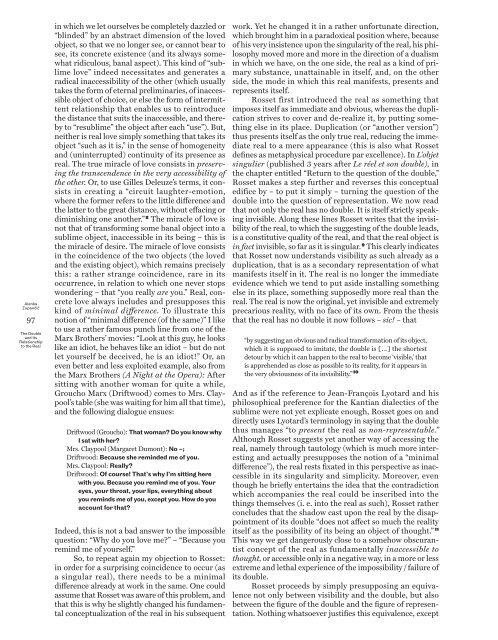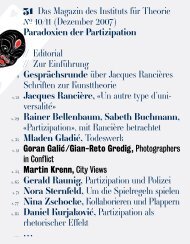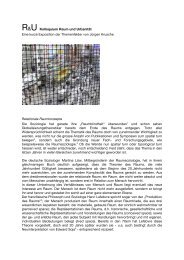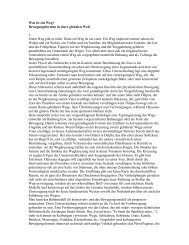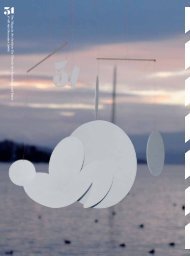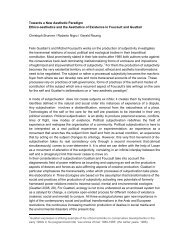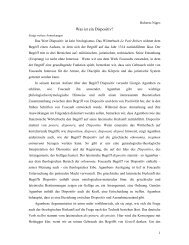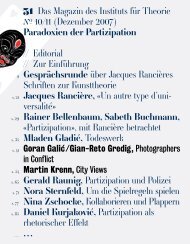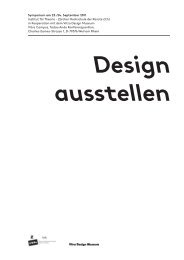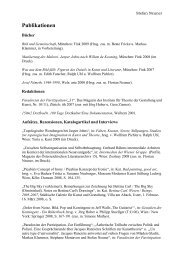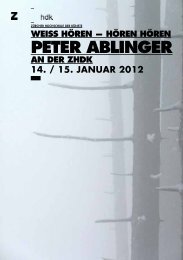Heft - Institut für Theorie ith
Heft - Institut für Theorie ith
Heft - Institut für Theorie ith
Sie wollen auch ein ePaper? Erhöhen Sie die Reichweite Ihrer Titel.
YUMPU macht aus Druck-PDFs automatisch weboptimierte ePaper, die Google liebt.
Alenka<br />
Zupančič<br />
97<br />
The Double<br />
and Its<br />
Relationship<br />
to the Real<br />
in which we let ourselves be completely dazzled or<br />
“blinded” by an abstract dimension of the loved<br />
object, so that we no longer see, or cannot bear to<br />
see, its concrete existence (and its always somewhat<br />
ridiculous, banal aspect). This kind of “sublime<br />
love” indeed necessitates and generates a<br />
radical inaccessibility of the other (which usually<br />
takes the form of eternal preliminaries, of inaccessible<br />
object of choice, or else the form of intermittent<br />
relationship that enables us to reintroduce<br />
the distance that suits the inaccessible, and thereby<br />
to “resublime” the object after each “use”). But,<br />
ne<strong>ith</strong>er is real love simply something that takes its<br />
object “such as it is,” in the sense of homogeneity<br />
and (uninterrupted) continuity of its presence as<br />
real. The true miracle of love consists in preserving<br />
the transcendence in the very accessibility of<br />
the other. Or, to use Gilles Deleuze’s terms, it consists<br />
in creating a “circuit laughter-emotion,<br />
where the former refers to the little di≠erence and<br />
the latter to the great distance, w<strong>ith</strong>out e≠acing or<br />
diminishing one another.” 8 The miracle of love is<br />
not that of transforming some banal object into a<br />
sublime object, inaccessible in its being – this is<br />
the miracle of desire. The miracle of love consists<br />
in the coincidence of the two objects (the loved<br />
and the existing object), which remains precisely<br />
this: a rather strange coincidence, rare in its<br />
occurrence, in relation to which one never stops<br />
wondering – that “you really are you.” Real, concrete<br />
love always includes and presupposes this<br />
kind of minimal di≠erence. To illustrate this<br />
notion of “minimal di≠erence (of the same)” I like<br />
to use a rather famous punch line from one of the<br />
Marx Brothers’ movies: “Look at this guy, he looks<br />
like an idiot, he behaves like an idiot – but do not<br />
let yourself be deceived, he is an idiot!” Or, an<br />
even better and less exploited example, also from<br />
the Marx Brothers (A Night at the Opera): After<br />
sitting w<strong>ith</strong> another woman for quite a while,<br />
Groucho Marx (Driftwood) comes to Mrs. Claypool’s<br />
table (she was waiting for him all that time),<br />
and the following dialogue ensues:<br />
Driftwood (Groucho): That woman? Do you know why<br />
I sat w<strong>ith</strong> her?<br />
Mrs. Claypool (Margaret Dumont): No –;<br />
Driftwood: Because she reminded me of you.<br />
Mrs. Claypool: Really?<br />
Driftwood: Of course! That’s why I’m sitting here<br />
w<strong>ith</strong> you. Because you remind me of you. Your<br />
eyes, your throat, your lips, everything about<br />
you reminds me of you, except you. How do you<br />
account for that?<br />
Indeed, this is not a bad answer to the impossible<br />
question: “Why do you love me?” – “Because you<br />
remind me of yourself.”<br />
So, to repeat again my objection to Rosset:<br />
in order for a surprising coincidence to occur (as<br />
a singular real), there needs to be a minimal<br />
di≠erence already at work in the same. One could<br />
assume that Rosset was aware of this problem, and<br />
that this is why he slightly changed his fundamental<br />
conceptualization of the real in his subsequent<br />
work. Yet he changed it in a rather unfortunate direction,<br />
which brought him in a paradoxical position where, because<br />
of his very insistence upon the singularity of the real, his philosophy<br />
moved more and more in the direction of a dualism<br />
in which we have, on the one side, the real as a kind of primary<br />
substance, unattainable in itself, and, on the other<br />
side, the mode in which this real manifests, presents and<br />
represents itself.<br />
Rosset first introduced the real as something that<br />
imposes itself as immediate and obvious, whereas the duplication<br />
strives to cover and de-realize it, by putting something<br />
else in its place. Duplication (or “another version”)<br />
thus presents itself as the only true real, reducing the immediate<br />
real to a mere appearance (this is also what Rosset<br />
defines as metaphysical procedure par excellence). In L’objet<br />
singulier (published 3 years after Le réel et son double), in<br />
the chapter entitled “Return to the question of the double,”<br />
Rosset makes a step further and reverses this conceptual<br />
edifice by – to put it simply – turning the question of the<br />
double into the question of representation. We now read<br />
that not only the real has no double. It is itself strictly speaking<br />
invisible. Along these lines Rosset writes that the invisibility<br />
of the real, to which the suggesting of the double leads,<br />
is a constitutive quality of the real, and that the real object is<br />
in fact invisible, so far as it is singular. 9 This clearly indicates<br />
that Rosset now understands visibility as such already as a<br />
duplication, that is as a secondary representation of what<br />
manifests itself in it. The real is no longer the immediate<br />
evidence which we tend to put aside installing something<br />
else in its place, something supposedly more real than the<br />
real. The real is now the original, yet invisible and extremely<br />
precarious reality, w<strong>ith</strong> no face of its own. From the thesis<br />
that the real has no double it now follows – sic! – that<br />
“by suggesting an obvious and radical transformation of its object,<br />
which it is supposed to imitate, the double is […] the shortest<br />
detour by which it can happen to the real to become ‘visible,’ that<br />
is apprehended as close as possible to its reality, for it appears in<br />
the very obviousness of its invisibility.” 10<br />
And as if the reference to Jean-François Lyotard and his<br />
philosophical preference for the Kantian dialectics of the<br />
sublime were not yet explicate enough, Rosset goes on and<br />
directly uses Lyotard’s terminology in saying that the double<br />
thus manages “to present the real as non-representable.”<br />
Although Rosset suggests yet another way of accessing the<br />
real, namely through tautology (which is much more interesting<br />
and actually presupposes the notion of a “minimal<br />
di≠erence”), the real rests fixated in this perspective as inaccessible<br />
in its singularity and simplicity. Moreover, even<br />
though he briefly entertains the idea that the contradiction<br />
which accompanies the real could be inscribed into the<br />
things themselves (i. e. into the real as such), Rosset rather<br />
concludes that the shadow cast upon the real by the disappointment<br />
of its double “does not a≠ect so much the reality<br />
itself as the possibility of its being an object of thought.” 11<br />
This way we get dangerously close to a somehow obscurantist<br />
concept of the real as fundamentally inaccessible to<br />
thought, or accessible only in a negative way, in a more or less<br />
extreme and lethal experience of the impossibility / failure of<br />
its double.<br />
Rosset proceeds by simply presupposing an equivalence<br />
not only between visibility and the double, but also<br />
between the figure of the double and the figure of representation.<br />
Nothing whatsoever justifies this equivalence, except


